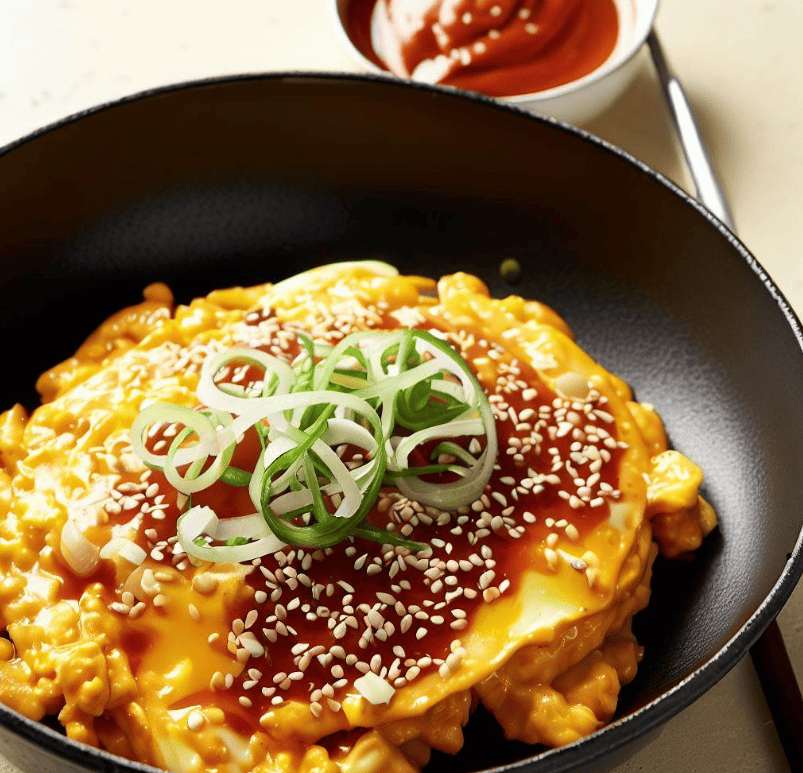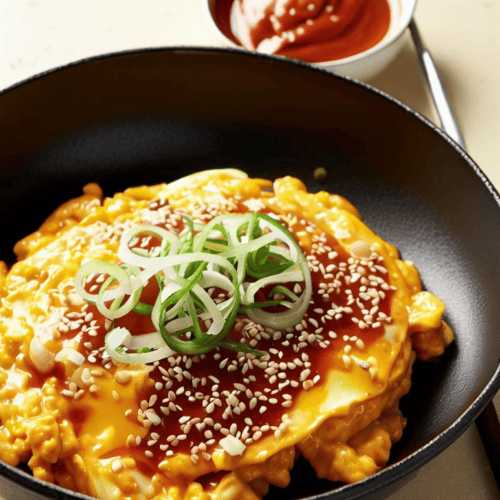Gochujang, the savory-spicy fermented Korean chili paste, adds a delicious kick to many dishes.

When mixed with eggs, gochujang brings out the eggs' richness while providing a punch of umami, sweetness, and heat.
Gochujang eggs are simple to make yet complex in flavor.
Read on to learn all about making gochujang eggs at home.
Choose Your Gochujang Wisely
Not all gochujangs are created equal. For the best flavor in your gochujang eggs, seek out a high-quality gochujang made in Korea. These are often found in the refrigerated section of Asian grocery stores. The color should be a deep red and the texture thick and pungently aromatic. Stay away from watery gochujangs or ones with a lot of seeds, as these are likely lower quality.
When shopping, look for gochujang made with more Korean chili pepper than sweet rice powder. This will provide maximum spicy flavor. However, if you prefer less heat, choose a sweeter gochujang with more rice powder than chili.
Once opened, store gochujang in the refrigerator where it will keep for several months. The spiciness mellows over time, so use older gochujang when desiring a milder flavor.
Add Gochujang to Eggs
There are several easy ways to incorporate gochujang into egg dishes:
Scrambled eggs: Whisk a teaspoon or more gochujang into eggs before scrambling. The spicy, umami flavor infuses the fluffy scrambled egg curds. Grate cheese into the eggs for added richness.
Fried eggs: Stir a bit of gochujang into the hot oil before frying eggs. The crisp edges take on a reddish hue and subtle spiciness.
Poached eggs: Make a simple sauce by thinning gochujang with water, rice vinegar, soy sauce, sesame oil, and a touch of sugar or maple syrup. Poach eggs directly in the sauce for spicy, saucy eggs.
Baked or shakshuka eggs: Bake eggs in a skillet of tomato sauce amped up with gochujang. The sweet-spicy flavor soaks into the whites and bright yellow yolks.
Omelets and frittatas: Incorporate a spoonful of gochujang into the egg mixture before cooking omelets or frittatas. The red pepper paste adds both color and flavor.
Complementary Ingredients
Certain ingredients pair particularly well with gochujang eggs. Consider adding:
- Scallions: Thinly sliced scallions provide bites of fresh oniony flavor and green color.
- Sesame seeds: Toasted white or black sesame seeds accentuate the nuttiness of gochujang.
- Kimchi: The sour-spicy fermented cabbage works in harmony with the fermented gochujang.
- Tofu: Silky soft tofu soaks up the sauce surrounding gochujang eggs.
- Mushrooms: Meaty mushrooms add savoriness to balance the sweet heat.
- Cheese: Melty cheese contrasts nicely with the chili kick. Cheddar, feta, and Parmesan are all good choices.
- Herbs: Fresh cilantro, Thai basil, mint, or parsley help cut the richness of the eggs.
- Citrus: Wedges of lime or yuzu brighten up the flavor. A splash of rice vinegar also works.
- Onions: Quick-pickled red onions or sliced fresh onions give crunch.
- Avocado: Creamy avocado cools down spicy gochujang eggs.
Best Dishes for Gochujang Eggs
Looking for inspiration on how to use gochujang eggs? Here are some tasty dishes to try:
Gochujang Shakshuka
Shakshuka is a Middle Eastern dish of eggs baked in a tomato sauce. Add 2-3 tablespoons of gochujang to the sauce along with spices like cumin and paprika. Bake the eggs in the sauce until the whites are set and the yolks runny. Sprinkle with feta cheese and fresh cilantro. Serve with warm flatbread for dipping up the spicy tomato sauce.
Gochujang Egg Drop Soup
Transform egg drop soup into a spicy Korean version by whisking gochujang into the broth. Add bite-size pieces of tofu, minced scallions, and spinach or bok choy. Drizzle the egg-gochujang mixture into the hot broth. Top bowls with a sprinkle of toasted sesame seeds.
Bibimbap with Gochujang Eggs
For this Korean rice bowl dish, make a fried egg seasoned with a bit of gochujang. Layer the rice bowl with sautéed vegetables, kimchi, and meat or mushrooms. Nestle the spicy gochujang egg on top and drizzle with more gochujang sauce.
Gochujang Breakfast Burrito
Scramble eggs with gochujang, cheese, and sautéed peppers and onions. Roll up in a warm flour tortilla with diced avocado and tomato salsa for a spicy breakfast burrito.
Gochujang Egg Salad Sandwich
Hard-boil eggs, then mash with mayonnaise, diced celery, minced scallion, salt, and a spoonful of gochujang. Spread on slices of bread or a croissant for a more interesting take on an egg salad sandwich.
Tweak the Heat Level
The amount of gochujang you use will determine the spiciness of the final dish. For mild flavor, start with 1 teaspoon gochujang per 2-3 eggs and add more to taste. If you can handle the heat, use up to 1 tablespoon of gochujang per egg.
Reduce spiciness by adding sugar, honey, maple syrup, or sweet rice powder to the gochujang. Increase heat by incorporating extra Korean red pepper powder.
Mixing in cool, creamy ingredients like cheese, yogurt, mayonnaise, or avocado also balances the chili pepper's burn.
Frequently Asked Questions
What does gochujang taste like?
Gochujang has a sweet, salty, and spicy flavor profile. The spiciness comes from Korean red chili peppers. Sweetness is provided by sticky rice powder and sometimes added sugar. The fermented soybeans lend an umami, almost cheese-like taste. When added to eggs, gochujang gives them a pleasant heat along with hints of sweetness.
What is the best way to add gochujang to eggs?
There are many ways to incorporate gochujang into eggs:
- Whisk it into scrambled eggs before cooking
- Mix it into a shakshuka-style tomato sauce and bake eggs in it
- Stir a bit into hot oil before frying sunny-side eggs
- Thin it with water and soy sauce to poach eggs in
- Add it to omelets, frittatas, and egg salad
What ingredients pair well with gochujang eggs?
Try topping gochujang eggs with sliced scallions, sesame seeds, kimchi, cheese, avocado, mushrooms, or fresh herbs. Citrus and vinegar help cut the richness. Meats like spam or chorizo also complement the sauce.
How spicy are gochujang eggs?
The spiciness depends on the amount of gochujang used. For mild flavor, start with 1 teaspoon per 2-3 eggs and add more to taste. For extreme heat, use up to 1 tablespoon per egg. Balance the chili heat by adding a creamy ingredient like cheese or avocado.
Conclusion
Half the fun of cooking with gochujang is experimenting with different flavors and textures. Try gochujang eggs for breakfast, lunch, dinner, or snacks. Bake, fry, poach, or scramble them. Fold in meats, vegetables, cheeses, herbs - let your imagination run wild!
The sweet, savory, spicy taste of gochujang never fails to jazz up humble scrambled eggs or transform a simple poached egg into a luxurious, sauce-drizzled treat. With a jar of gochujang in your pantry, you'll never tire of eggs for breakfast, lunch, and dinner!

Gochujang Eggs
Ingredients
- 4 eggs
- 1 tablespoon gochujang (Korean chili paste)
- 1 teaspoon vegetable oil
- 2 scallions, sliced
- 1 teaspoon sesame seeds
- Salt and pepper to taste
Instructions
- In a small bowl, whisk together the eggs and gochujang until well combined. Season with salt and pepper.
- Heat the vegetable oil in a skillet over medium heat. Pour in the egg mixture and cook, stirring occasionally, until eggs are scrambled and cooked through, about 5 minutes.
- Remove pan from heat. Top eggs with scallions and sesame seeds.
- Serve eggs immediately, while hot.

